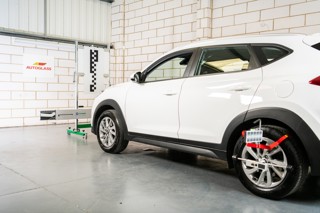New vehicle safety systems, such as emergency braking technology, are being switched off by drivers, new research suggests.
The range of Advanced Driver Assistance Systems (ADAS) have become increasingly common in new cars and vans.
Autonomous emergency braking (AEB), for example, has become standard in many new fleet cars, but the research from Autoglass shows there is still a lack of knowledge and awareness.
It found that almost a quarter (24%) of drivers with ADAS enabled vehicles said they were not provided with any information about the importance of these features and how they work when they had the vehicle handed over to them.
The survey of almost 1,400 drivers also found that 41% intentionally switch off safety systems such as AEB or lane departure warning systems, while driving.
Neil Atherton, sales and marketing director at Autoglass, said that ADAS can help keep drivers and passengers safe, but only if the technology is “switched on and operating correctly”.
“ADAS is becoming more and more common in UK fleets and so more should be done to educate drivers, to encourage positive behaviour and ensure the systems are being used correctly,” he said
“Fleet managers have a responsibility to not only help drivers understand the benefits of these systems but also to review their supply chain to ensure the vehicles are being maintained to the correct standards.”
The cameras and sensors that ADAS relies on need to be recalibrated to manufacturer standards if they have been impacted by a windscreen replacement, and in some cases body damage, to ensure the features are working correctly.
However, more than half (55%) of respondents were unaware that they need to be recalibrated when the windscreen is replaced and 52% of drivers were unaware that the cameras may need to be recalibrated if they have been impacted by body repair work.
When asked, two thirds (67%) of drivers agreed that more education is needed around the importance of ensuring this technology is properly maintained.
“It is paramount that fleet managers have a trusted partner who can carry out the recalibrations to industry standards,” said Atherton.
The increasing number of ADAS enabled vehicles in UK fleets has inevitably led to an increase in demand for recalibration.
In response to this, Autoglass has opened 12 new centres this year, taking the total number of centres in the UK to 90, to allow recalibration to be done in-house.
The new centres have been opened across the UK including Reading, Derby, Carlisle and Banbury.
The locations have been chosen to provide fleets with a more convenient service, and all centres offer windscreen repair and replacements, ADAS recalibration and replacement wiper blades, says Autoglass.
Atherton concluded: “Looking ahead to 2021, we are continuing our plans of opening more centres to ensure we are doing all we can to keep fleet drivers safe on the roads.”

























James Halliday - 15/12/2020 12:01
My wife's car has automatic emergency braking at low speed. We disabled it because her mother's driveway has overhanging plants, and the ADAS system would perform an emergency stop three or four times as we reversed up the drive. It'd also do an emergency stop whenever either of us drove into a car parking space. We're not driving like nutters, but are confident and capable of turning into a parking space and stopping before hitting the hedge/barrier/parked car at the end. In a nutshell, the system on her car is far too sensitive and far too cautious. While I understand these systems have developed out of a need to make cars safer, I can't help thinking that a little investment into more advanced and progressive driver training would reap benefits too.